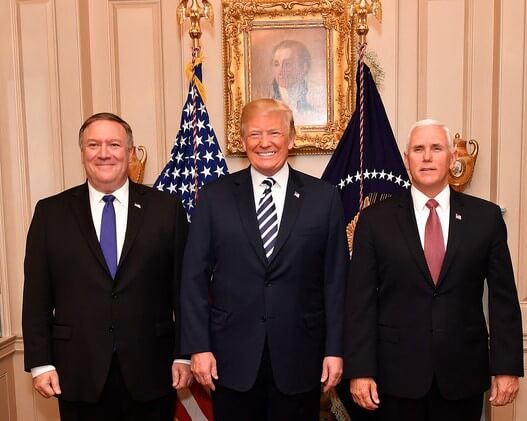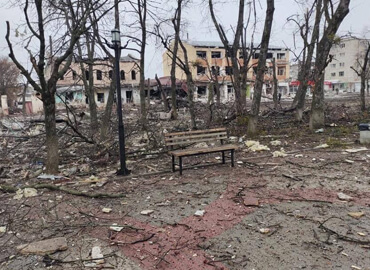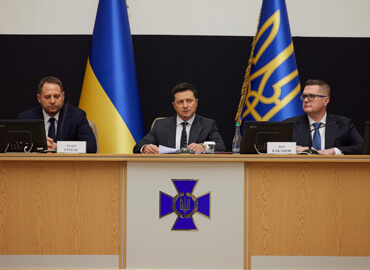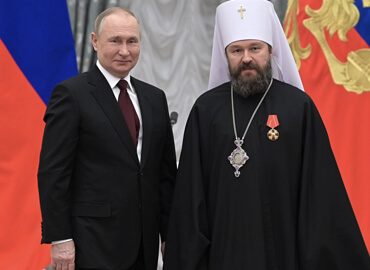Recent events as well as developments over the last two years spell trouble for Belarus. The country needs to get rid of its illusions and improve its sales pitch to the West.
Two weeks ago, the news broke that Belarus would actually be included in the “blacklist” of countries whose entry is restricted to the United States. The final list, however, omitted Belarus while other countries such as Eritrea, Kyrgyzstan, Myanmar, Nigeria, Sudan and Tanzania will face new restrictions because of their failure to meet US security and information standards.
While the travel ban threat was neutralised by diplomatic methods, it is a situation from which serious lessons should be learned.
The question is not only and not so much about the technical side of the matter – the EU has invested a decent amount of money in the introduction of biometric passports and closer cooperation on border security.
Scapegoat in the middle of Europe

Mike Pompeo, Donald Trump and Mike Pence
Among the possible reasons why Belarus could have been on the initial list of candidates, some sources named an absolutely stunning reason – it was necessary to find a miscreant country that would not be Muslim nor be part of the traditional travel bans regarding Africa and Asia. This to avoid any accusations of discrimination against Muslims, since Trump’s ban on entry in everyday life is called the “Muslim ban”.
And what a surprise – the only country that met these criteria was Belarus. For those who are not much into the strategic priorities of US foreign policy: why was it possible for a country located in the middle of Europe to be designated a scapegoat?
In addition to the possible problem of biometric passports, Belarus has a reputation for being a friend of rogue regimes (at one time, part of Belarusian enterprises fell under US sanctions for cooperation with Iran). Belarusian passports – real or fake – pop up in the hot spots on the ‘wrong’ side. Was this enough to just ‘victimise’ a country when you need one or was there another reason?
The ‘agency’ of a country
Belarus’ Ukrainian neighbours very often talk about such a problem in terms of the ‘agency’ of a country, not just in the context of the Minsk format. This means it more than just about the recognition of the independence or sovereignty of the territory. It is also the recognition of the status of an actor for the country, which acts independently and makes decisions, whose interests are recognised and cannot be exchanged behind its back.
So, does Belarus have such agency?
It is precisely the recent events as well as developments of the last two years that make us think about this issue. We are not talking about the events as such, but about the discourse. After all, the travel ban has not materialised, and we are discussing not the ban itself but the discourse surrounding it.
In recent times, the main discourse on every issue has the same property – it is about the preservation of the independence and sovereignty of Belarus. It is difficult for us to imagine that the fate of any other country was discussed in a similar vein: how the Kremlin would decide what to do with Belarus, whether it would be annexation by force or whether it would be a quasi-peaceful takeover? What would happen to the president of that country?
Belarus would remain a banana republic with the attributes of statehood, but without any independence in decision-making.
Of course, we can say that the emergence of such a discourse was opened by the Kremlin with the annexation of Crimea and the prompting of the war in Donbas, simply in revenge for Ukraine’s attempt to show its agency and get out of the Kremlin’s influence. This is certainly true, but only in part.
The first proposal for Belarus “to join Russia by six regions” was voiced by Putin in 2002. Of course, Lukashenko refused, but even then it was worth understanding that ‘Big Brother’ was unlikely to give up this idea.
Unfortunately, the whole history of the so-called Union State has led to today’s situation. The further the development of authoritarianism in Russia proceeded, the more each appeal to the Kremlin for support, not only by the ruling group, but by any politically active forces, led to the loss of Belarus’ agency in the eyes of the Kremlin and, most importantly, the international community.
Reinforcing imperial aspirations
Basically, we already know that the Putin’s Kremlin did not and does not perceive the countries that gained independence after the collapse of the USSR as fully independent states whose sovereignty should be respected but only as objects of geopolitical interests of Russia and its sphere of influence, a piece of the world under its control.
This is evidenced by the whole chain of hot spots on the post-Soviet map. The arsenal of influence preservation is wide – from the purchase of oligarchic and political elites to economic and propagandistic pressure and direct military intervention.
In this sense, every ‘success’, every appeal for support and help, every dependence only reinforces the imperial aspirations of the Kremlin.
As such, the policy of Belarus in its relations with Russia, labelled as “gas for kisses”, worked to consolidate the dependence of Minsk on Moscow not only economically, but also politically, especially in the eyes of the international community.
No need to take sides
The ‘multi-vector’ foreign policy that declared from time to time has looked and continues to look unconvincing, a situational rather than systematic policy, and so it is perceived in the West.
During a recent visit to Belarus, US Secretary of State Mike Pompeo suggested that Minsk does not need to take sides between Washington and Moscow.
There are no convincing steps or signals that would force us to take seriously our intentions to build at least a truly ‘multi-vector’, systematic policy. There are only calls to accept a ‘dirty love’ and somewhere the belief exists that in case of a really critical situation, “the West will save us”.
In the same visit to Belarus, Pompeo said that the US can supply the country with oil and gas after the recent supply-cut applied by Russia.
Pompeo’s brief stop in Minsk, the first state secretary visit in 26 years, adds to the strange confidence in a bright future that will not require a lot of transformation. Part of the expert community of Belarus speaks confidently about the fact that Belarus is so much needed by the West now, that it sooner or later will cooperate without any conditions or even on Belarusian terms.
They suggest that the danger for Belarus’ independence is over now, since the Russian, or rather Putin’s, ‘2024 problem’ is solved in a different way.
Pressure increase
Frankly speaking, all of this looks like a fantastic frivolity, especially against the backdrop of recent appointments in the Russian government and the presidential administration.

Dmitry Kozak
It is especially worth paying attention to the appointment of Dmitry Kozak to the specially created place for another deputy head of the presidential administration of the Russian Federation, and the fact that he will now be the curator of Donbas.
Judging by the fact that Surkov, who left the administration, was also in charge of Belarus, it is most likely that Belarus will fall into Kozak’s sphere of responsibility. No easing of pressure is expected, but rather it can only increase.
Russia has no reason to cancel its plans to recreate the empire, since the takeover machine has been created and put into action, and the imperial ideology has always been and remains the basis of Putin’s Kremlin policy.
And again, note, we are discussing the future fate of Belarus in connection with the latest events in Russia, which has actually granted itself the status of the Eurasian Metropolis.
Long-term dependence
Hence, what does the international community see in place of the so-called ‘multi-vector’ approach – if we leave aside the long-term theme of Europe’s ‘last dictatorship’?
It sees long-term dependence on the Kremlin, both economic and political. Economic dependence on the Kremlin results from an unwillingness to carry out any economic transformation. Instead, the only way is to live on a subsidy and rent from participation in the Union State. It is clear to everyone that economic dependence leads to political dependence.
The Union State is an entity poorly understood by international observers, but it quite visibly fixes political dependence of Belarus on Russia, since there can be no parity of countries here, whatever is declared orally and on paper.
The appearance of this dependence also adds close military cooperation between Russia and Belarus, and only the absence, until now, of Russian military bases in Belarus, makes the situation a little bit more complicated.
In the international arena, in the UN, for example, we see solidarity votes with Russia and other prominent ‘democracies’ such as Iran, Venezuela and North Korea on worldly affairs.
Again, the situation is partly saved and despite the efforts of the Kremlin and its aides, of Belarus’ non-recognition of the annexation of Crimea as well as the separatist territories (the latter is not surprising, to be honest).
Participation in regional and international initiatives does not yet work in favour of Belarus, by and large. We can speak about some positive efforts in relation to the work of Belarusian diplomats in the sphere of the OSCE, but these are more likely tactical success in promoting the independence of Belarus.
Idle partnership
At the same time, Belarus is the only European country that is not a member of the Council of Europe. The minimum requirement for Belarus to at least obtain the status of an observer is to introduce a moratorium of the death penalty (not even abolishing it yet!). Its barbaric way of punishment creates a negative image of the country and prevents the country from being fully included in the European framework.
Greater involvement in a larger Europe would help Belarus to solve many issues related to strengthening its independence – this means political protection and support, economic transformation, and the inclusion in the European energy framework.
All things considered, Belarus does not have a basic agreement with the EU on partnership and cooperation due to systemic violations of human rights. Additionally, a possible agreement within the Eastern Partnership has been idle because of the unreasonable decision to build, again, a Russian nuclear power plant on the border with the European Union in violation of the Aarhus Convention and other agreements previously signed by Belarus.
We see how negotiators from Belarus – whether they are official diplomats or their assistants from among expert and lobby groups – are trying to sell the ‘special Belarusian way’ to their Western partners as a basis for relations. Unfortunately, to the interlocutors, this looks like the same old wine in new bottles, part of almost two decades of a ‘swing game’ between the East and West. It is not a kind of sustainable policy aimed at positive changes country or an attempt at strategic cooperation.
It is an unconvincing sales pitch, and no wonder why the Polish Foreign Affairs Undersecretary Paweł Jabłoński speaks of “too weak signals”.
Not going to tilt
Perhaps the governing elites of Belarus still have the illusion that they will be able to come to an agreement with the Kremlin, once again, after Putin comes to his senses. From our point of view, this is unlikely, at least in the foreseeable future, as long as there is a regime based on an imperial ideology.
As for the dialogue with the West, one must understand that no one is going to “tilt” anyone, but there are minimal common denominators, i.e. steps demonstrating the will to positive changes and Belarus’ agency.
In the meantime, Belarus as a country cares only for the circle of figures involved in Eastern politics. For all the rest, Belarus is a certain place, a name on a presumably European map, which, if necessary, can be added to different lists, since, most likely, it is still just a satellite of Russia, not included in any serious European partnership framework, and its reputation and connections are rather dubious.
It was originally published on Reform.by and translated into English with the support of iSANS.











